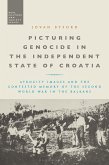In the years following the fall of Slobodan Milosevic, Serbian social, cultural and political responses to the wars of the 1990s have fallen under intense scrutiny. In Ethnic Conflict and War Crimes in the Balkans, Jelena Obradovic-Wochnik explores some of those responses - taking into consideration notions such as silence, denial and conspiracy theory, the book sheds some light on the complicated narratives about the 1990s. The book considers the experience of knowing, witnessing and speaking about atrocities, and thus contributes to the debates on confronting the past in Serbia. Specifically, it considers how individuals of the "ordinary" public in Serbia reflect upon, understand and keep secrets about the 1991-1999 conflicts in Croatia, Bosnia and Herzegovina and Kosovo, and the atrocities, human rights abuses and war crimes which were committed there. Close attention is paid to the stories of individuals whose voices and experiences are generally excluded from the broader debate about the past. Jelena Obradovic-Wochnik explores how these narratives diverge from, resist and are invisible to the formal and civil society initiatives aimed at confronting the past in Serbia.In doing so, the book also explores silence about and denial of the violent past, and considers how and where these dynamics manifest and what they might mean.
In addition, it covers themes such as narratives of self-victimhood, conspiracy theory and the perception of war-time leaders and combatants. This is a detailed and considered investigation into how groups cope with knowledge and the witnessing of violent pasts. It is based on ethnographic research and interviews with a group of 'ordinary' individuals, in post-Milosevic Serbia. As such, it provides a unique perspective on the lived experience of the conflicts, and the ways in which stories of the 1990s emerge in everyday contexts.
In addition, it covers themes such as narratives of self-victimhood, conspiracy theory and the perception of war-time leaders and combatants. This is a detailed and considered investigation into how groups cope with knowledge and the witnessing of violent pasts. It is based on ethnographic research and interviews with a group of 'ordinary' individuals, in post-Milosevic Serbia. As such, it provides a unique perspective on the lived experience of the conflicts, and the ways in which stories of the 1990s emerge in everyday contexts.









